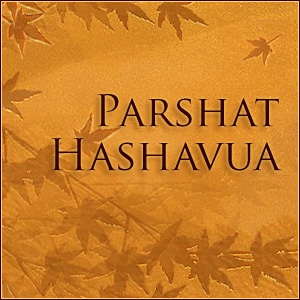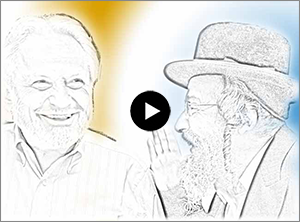Parshas Emor
In Parshas Emor we find some of the prohibitions for Kohanim.
 The Parsha of Emor
The Parsha of Emor
In the Parsha of Emor we read about the prohibition for Kohanim to have contact with a mais, a dead person. The Or HaChaim HaKadosh brings from the Medrash Tanchuma, that the A’lmighty says, “it is not nice, it is inappropriate, for those who come and go before me to look at a mais”. Those who come and go before me are a reference to the Kohanim who do the Avoda in the Bais HaMikdash. I understand that the Medrash is giving one of the fundamental reasons behind the prohibition, even though the fundamental doesn’t necessarily explain all of the details, like its application today when we don’t have a Bais HaMikdash, or that the prohibition also applies to being under the same roof as a mais, even from room to room, even though the Kohain doesn’t see, per se, the mais. At any rate, the Medrash needs an explanation, at first glance it would seem that the Medrash doesn’t supply us with a clear understanding what is the point which is “not appropriate”.
The Gemora Brochos
I suggest to understand the Medrash in the spirit of what it says in the Gemora Brochos, “Le’olam yargiz …”, the recommended approach for vanquishing the Yetzer Harah when he sticks his nose in and tempts us with that which is forbidden, is first of all to make war with the Yetzer HaTov against the Yetzer Harah. For example, to think out, (and maybe to speak out), that it is silly to give in to the temptation to do wrongfulness, because the pleasure that he will gain will be indeed fleeting, whereas the reward that he will earn from subjugating his will to the Will of the A’lmighty will be forever, and incomparable in magnitude. The gemora says, if he wins, great! Otherwise, (if he doesn’t find himself with the spiritual fortitude to be able to crush his Yetzer), he should sit and learn Torah, since Torah brings down upon a person a holiness which will indeed give him the spiritual fortitude to succeed.
Shema
If he wins, great! Otherwise he should read the Shema, which is the Miztva of accepting upon ourselves G-d’s Kingship. That is, to say to his Yetzer, “I’m very sorry, there is a King here, and the King says “no”, and no is no.” If he wins, great! Otherwise he should remind himself of the day of death. That after 120 years when the soul separates from the body, and the body is buried, and the soul goes up to stand before the Heavenly Court, there he will have to give an accounting for all of his actions, from the biggest down to the smallest, and even on this current temptation. So in the end it’s going to be a very expensive ordeal, and it is just not worthwhile.
All of the commentators ask on this Gemora, if we see that the strongest argument against the Yetzer is to remind oneself of the day of death, then why not begin with that, why do we have to go through the other three steps? And each commentator goes according to his way, but a thread that is generally in common to all of the approaches is that it’s not right to start with the fourth step, only if nothing else works. Some say because it is negative, and the better way is to arouse inspiration for the love of Hashem Yisborach, and for the recognition of His Kingship, then just to worry about one’s own skin, so to speak.
The Zohar HaKadosh
This is a similar idea to that which the Bais Yosef writes in siman 131 regarding tachnun. He brings there a piece from the Zohar HaKadosh explaining that a person during tachnun, specifically during “Nefilas Apayim”, (when he puts his head down on his arm), he attaches himself to the “Tree of …”, and in the merit of that, G-d grants him forgiveness, and lech’ora as a result he gets reattached to the Tree of Life. That is, that when a person davens Shacharis, and admits during Shmone Esreh that he has done sins, and then the viduy of tachnun, ashamnu, bagadnu, etc., a thinking man must reflect that to transgress against the Will of the A’lmighty is a terrible thing. The King said don’t do it, and me in my brazenness I went ahead and I did it. And it’s not like I was in my room and nobody saw, and the King is far away in his palace, no! The Presence of Hashem fills the whole world, He sees everything, and He knows everything. See the first Remah at the beginning of Shulchan Aruch.
A person needs to understand that the logical consequence for transgressing against the King is that it is coming to him that he give up his very life to atone for his sin(s). In any normal kingly scenario, regarding any king who has the power over life and death, if the king says, “do not step over this line or else”, a person who steps over the line must expect to get his head cut off. When a person internalizes this, and sits down, and buries his face in his arm, and cries out the first verse there from Psalms 25, Elecha Hashem Nafshi Esa, that I’m ready to give up my life for You for atonement, when Hashem Yisborach sees that we indeed understood the lesson (and take upon ourselves not to do it again), and we submit ourselves to Him completely, a gevaldiga subjugation to the point of admitting what is indeed coming to us, then, through that merit, Hashem grants us forgiveness and puts us back on to the Tree of Life.
Just that the Zohar itself says that not everyone can really do this right, with proper intention of the heart, and therefore one should be careful before taking upon himself such a thing. It’s a bit dangerous. And indeed, there is almost nobody today that says kapitil 25 with Nefilas Apayim anymore except for Chabad. The Sfardim say kapitil 25 without Nefilas Apayim, and the Ashkenazim do Nefilas Apayim but replace that which is said with kapitil 6 instead of 25.
At this juncture I would like to get something off my chest that I have never had the guts to say publicly. You know those arguments that break out in shul when those who daven Nusach Sfard want to skip tachnun for reasons which are not mentioned in Shulchan Aruch, and those that daven Nusach Ashkenaz get on their case? Sometimes I want to answer back, (but I don’t), especially to those whom it is clear from their actions that they haven’t grasped more then the external trappings of tachnun, “first learn what tachnun really is, see the Bais Yosef (the Bais Yosef, yes, not the Raishis Chochma), and then afterwards maybe try to understand what a person really needs to do for atonement (now go see the Raishis Chochma), and what has changed (even according to you), since the generation of the Noam Elimelech, and then maybe try to understand a little about what today is, and then maybe you’ll have enough sensitivity for the position not to say tachnun in order not to get into a fight about it”.
I think that the problem starts not because there is a lack of appreciation about what is a Rebbishe Yortzeit, rather because there is a lack of appreciation what tachnun actually is. I can’t say names without permission which I don’t have, but I know a mohel who told me personally that someone very very big, not chassidic, a VERY big Rav, asked him to come daven by him daily, in order that his congregation shouldn’t have to say tachnun (almost) ever.
The Three Weeks
Anyhow, there is a certain mood, a certain spirit, that prevails during Adar – Nisan, as opposed to the mood which prevails during the three weeks, Tamuz and Av. Maybe this is an expression of the difference between Avodas Hashem with Gadlus HaMochin as opposed to Katnus HaMochin, this is something that I haven’t had the chance to look into yet.
At any rate, there is certainly an appropriate time for hisromumus, the joyful rising up of the spirit, and there is another time for introspection and humbling oneself, like during the time of churban. If Hashem sees that we properly humble ourselves, internalizing the gevaldiga expression of the strictness of Divine judgment, that He destroyed the Bais Hamikdash, and let so many Yidden be destroyed, and exiled, and the whole Divine Presence and the Kingdom of Heaven went into hiding. To the extent that nowadays a person can be born and live a whole lifetime and die, and never once see any sign of the Divine Presence, and he feels that so long as he can keep off the radar of the Feds he can do whatever he wants … If Hashem sees that we properly internalize and humble ourselves, that will be the merit by which the redemption will finally come. “All those who mourn over Yerushalyim will merit to see her rejoicing”.
But when the Bais Hamikdash is in its place, and the Kingdom of Heaven is revealed, and the Kohanim do the Avoda, that’s the time for hisromemus, for uplifting the spirit, for appreciating that which we have, that which is revealed to us. So it’s “inappropriate for those who come and go before me”, the Kohanim in the Bais HaMikdash, to look at a mais, because that reminds us of the day of death. That is the fourth step of the above mentioned Gemora in Brochos, not the first choice, the first choice is to serve Hashem with uplifting of spirit appropriate for the time of binyan, when the Bais HaMikdash is in its place.
Boruch HaKohen Rappaport





1 Comment
Boruch Rappaport
November 20, 2009Thanks Dolly, I am pleased you like the articles. Enjoy!
Leave A Response